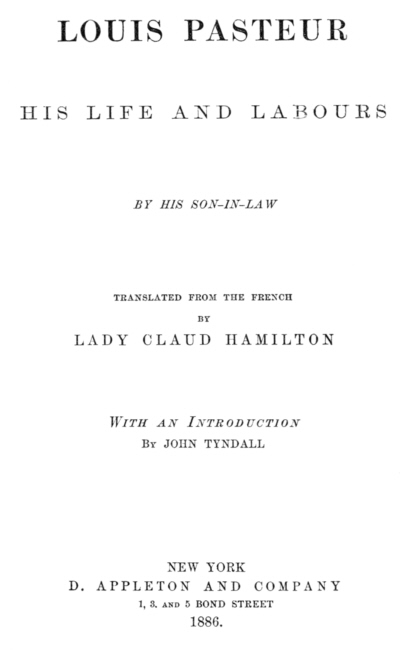LOUIS PASTEUR

LOUIS PASTEUR
HIS LIFE AND LABOURS
BY HIS SON-IN-LAW
TRANSLATED FROM THE FRENCH
BY
LADY CLAUD HAMILTON
With an Introduction
By JOHN TYNDALL
NEW YORK
D. APPLETON AND COMPANY
1, 3, and 5 BOND STREET
1886.
PREFACE.
In the salon of a distinguished man, or of a greatwriter, there is often to be found a person who, withoutbeing either a fellow-worker or a disciple, withouteven possessing the scientific or literary qualities whichmight explain his habitual presence, lives neverthelessin complete familiarity with the man whom all aroundhim call 'dear master.' Whence comes this intimateone? who is he? what is his business? He is onlyknown as a friend of the house. He has no othertitle, and he is almost proud of having no other.Stripped of his own personality, he speaks only of thelabours and the success of his illustrious friend, inthe radiance of whose glory he moves with delight.
The author of this work is a person of this description.Intimately connected with the life of M. Pasteur,and a constant inmate of his laboratory, he has passedhappy years near this great investigator, who has discovereda new world—the world of the infinitely little.Since the first studies of M. Pasteur on molecular[vi]dissymmetry, down to his most recent investigationson hydrophobia, on virulent diseases, and on the artificialcultures of living contagia, which have beenconverted by such cultures into veritable vaccines—passingby the intermediate celebrated experiments onspontaneous generation, fermentation, the diseases ofwine, the manufacture of beer and vinegar, and thediseases of silkworms—the author of these pages hasbeen able, if not to witness all, at least to follow inits principal developments this uninterrupted series ofscientific conquests.
'What a beautiful book,' he remarked one day toM. Pasteur, 'might be written about all this!'
'But it is all in the Comptes-rendus of theAcademy of Sciences.'
'It is not for the readers of the Comptes-rendusthat such a book needs to be written, but for the greatpublic, who know that you have done great things,but who know it only vaguely, by the records ofjournals, or by fragments of biography. The personsare few who know the history of your discoveries.What was your point of departure? How have youarrived at such and such principles, and at the consequenceswhich flow from these principles? What isthe connection and rigorous bond of your method?These are the things which it would be interesting toput together in a book which would have some chanceof enduring as an historic document.'
'I coul